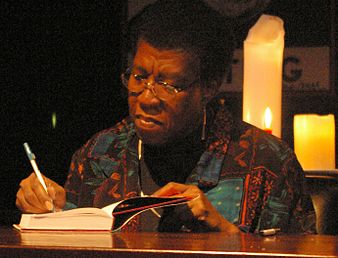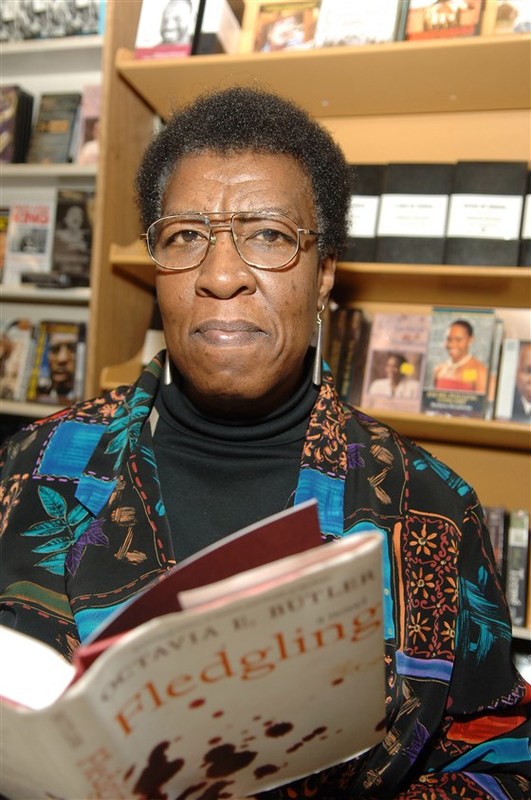Methods and Design
Methods and Design
Kindred
For this project the interactions between Dana and her husband Kevin, Rufus Weylin, and Mr. and Mrs. Weylin, all white, were compared to Dana’s conversations with the enslaved and free black people who live on and around the Weylin home. Over seventy-five verbal conversations, plus several dozen internal monologues were analyzed.
Dana engages in conversation and exchanges with multiple people, black and white, in her own time and in the 1800s. This provides an easy way to compare the speech patterns she chooses when speaking with a modern day co-worker and her husband, who is white, and those she interacts with during her time in the past.
Examples of interactions:
When Dana first meets her future husband, Kevin, at work, he remarks that she seems to sleepwalk through the day.
Dana: "I do my work," I said quietly.
Kevin: "Buz told me you were a writer"
Dana: "Look, I can't count with you talking to me"
Dana chooses to "talk back" to Kevin, even though he is white and male. She does not respond specifically to his questions, flirt, or try to make conversation. Instead, she asserts herself and addresses him as someone to whom she is at least equal, if not superior.
Dana's first interaction with Mrs. Weylin, while rescuing Rufus:
Dana: “Stop it!” I shouted, putting all the authority I could into my voice. “He’s alive!” Was he? I couldn’t tell. Please God, let him be alive. “The boy’s alive. Now let me help him.” I pushed her away, glad she was a little smaller than I was, and turned my attention back to her son.
Dana thinks nothing of commanding Mrs. Weylin, a white woman she does not know, to stay out of her way while she attempts to revive Rufus. She does not see herself in any way beneath Mrs. Weylin.
When Dana meets Mr. Weylin outside of his son's room:
Dana: "Yes, I was reading to him...I think he was bored lying in there with nothing to do."
Mr. Weylin: "I didn't ask you what you thought," he said.
Dana: I said nothing.
And a second interaction with Mrs. Weylin:
Mrs. Weylin: "You filthy black whore!" she shouted.
Dana: I said nothing.
Mrs. Weylin: "I'll see you sent to the quarter where you belong!"
Dana: Still I said nothing. I looked at her.
Dana's use of silence in these interactions is just as important and deliberate as word choice. She knows there is strength in silence, and it is a way to assert her own power.
Dana conversing with Nigel, an enslaved man on the Weylin farm:
Nigel: "why you try to talk like white folks?"
Dana: "I don't," I said, surprised. "I mean, this is really the way I talk."
Nigel: "More like white folks than some white folks."
Dana: "My mother taught school..."
Nigel: "A n----r teacher?"
Dana: "Free blacks can have schools. My mother talked the way I do. She taught me."
Dana: (thinking to herself) I wasn't good at accents, I had deliberately decided not to try to assume one.
This exchange is ripe with information about how Dana sees herself, and how the black people of the Weylin time period see her. She is seen as an outsider, someone who "talks white" - long a thing of contention in the African American community from the time of slavery to present day. Dana, and by extension Butler herself, defends her speech as being what is normal to her and her family. Further, Dana refuses to alter her speech or attempt a period appropriate accent, even though it might make things easier for her. Perhaps it is stubbornness on her part, but Dana's refusal to yield even this part of herself shows how important her voice is to her, that she will not stifle it even though doing so may cause her trouble. This exchange exemplefies how separate Dana is from the very people who should be her refuge during her visits to the Weylin timeline.
Fledgling
As with Kindred, conversations between Shori and the human symbionts she gathers to protect her are analyzed, as well as her conversations with the Ina, who are vampires like she is. Shori chooses Wright and Theodora, both white, as her first symbionts, and then Joel, a black man. The Ina are of white-European origin, and appear as normal humans, though taller and paler. Shori speaks as an adult to the adults around her and does not use any childlike language. Much of Shori's introductory speech are her internal monologues as she tries to discover who she is. These were analyzed along with over fifty verbal conversations.
Examples of Interactions:
When Shori first introduces herself to Theodora, a woman she has chosen as a symbiont, Theodora is shocked. Shori has come to her before but has not revealed herself:
She came up behind me, and when I turned to face her, she stopped, staring at me with a kind of horror.
Shori: "Is it my skin color or apparent age that's upsetting you so?
Theodora: "Why are you here?" She demanded.
Shori: "To talk with you," I said. "You have to see me."
Theodora: "I didn't want to see you!"
Shori: "It will make a difference, but not as great a difference as you think."
Though Shori is black and appears as a child, she addresses Theodora as her superior, and does not respond to Theodora's apparent bigotry, but insteads indicates to her that Shori is the one who is in charge.
When Shori is first reunited with other Ina, they wish to keep her with them:
Iosif: "I was hoping to convince you to stay here until tomorrow night," he said.
Shori: I shook my head. "Take me back."
Iosif: "Shori, it would be best for you to stay here...if anything went wrong, even if one person spotted you with him..."
Shori: "You promised to give us a week," I said. "That was the first promise you made to me."
He stared down at me. I stared back.
Again, though Shori is much younger than the other Ina- still a child to them- and does not remember them, she addresses them as her equals; she does not plead, whine, or cajole. She simply states what she wants and expects it to be done.

